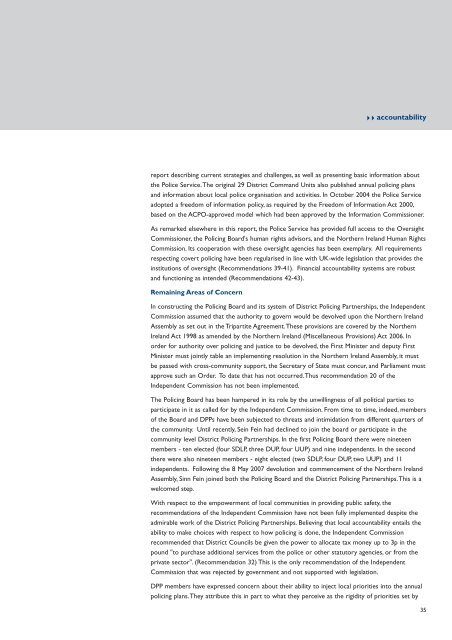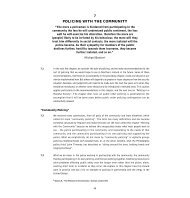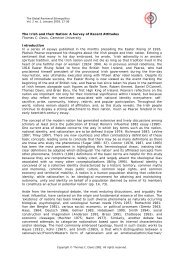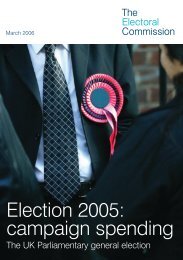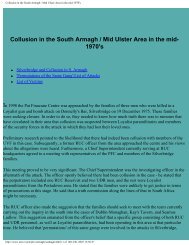11293 report 19 - CAIN - University of Ulster
11293 report 19 - CAIN - University of Ulster
11293 report 19 - CAIN - University of Ulster
Create successful ePaper yourself
Turn your PDF publications into a flip-book with our unique Google optimized e-Paper software.
accountability<strong>report</strong> describing current strategies and challenges, as well as presenting basic information aboutthe Police Service.The original 29 District Command Units also published annual policing plansand information about local police organisation and activities. In October 2004 the Police Serviceadopted a freedom <strong>of</strong> information policy, as required by the Freedom <strong>of</strong> Information Act 2000,based on the ACPO-approved model which had been approved by the Information Commissioner.As remarked elsewhere in this <strong>report</strong>, the Police Service has provided full access to the OversightCommissioner, the Policing Board's human rights advisors, and the Northern Ireland Human RightsCommission. Its cooperation with these oversight agencies has been exemplary. All requirementsrespecting covert policing have been regularised in line with UK-wide legislation that provides theinstitutions <strong>of</strong> oversight (Recommendations 39-41). Financial accountability systems are robustand functioning as intended (Recommendations 42-43).Remaining Areas <strong>of</strong> ConcernIn constructing the Policing Board and its system <strong>of</strong> District Policing Partnerships, the IndependentCommission assumed that the authority to govern would be devolved upon the Northern IrelandAssembly as set out in the Tripartite Agreement.These provisions are covered by the NorthernIreland Act <strong>19</strong>98 as amended by the Northern Ireland (Miscellaneous Provisions) Act 2006. Inorder for authority over policing and justice to be devolved, the First Minister and deputy FirstMinister must jointly table an implementing resolution in the Northern Ireland Assembly, it mustbe passed with cross-community support, the Secretary <strong>of</strong> State must concur, and Parliament mustapprove such an Order. To date that has not occurred.Thus recommendation 20 <strong>of</strong> theIndependent Commission has not been implemented.The Policing Board has been hampered in its role by the unwillingness <strong>of</strong> all political parties toparticipate in it as called for by the Independent Commission. From time to time, indeed, members<strong>of</strong> the Board and DPPs have been subjected to threats and intimidation from different quarters <strong>of</strong>the community. Until recently, Sein Fein had declined to join the board or participate in thecommunity level District Policing Partnerships. In the first Policing Board there were nineteenmembers - ten elected (four SDLP, three DUP, four UUP) and nine independents. In the secondthere were also nineteen members - eight elected (two SDLP, four DUP, two UUP) and 11independents. Following the 8 May 2007 devolution and commencement <strong>of</strong> the Northern IrelandAssembly, Sinn Fein joined both the Policing Board and the District Policing Partnerships.This is awelcomed step.With respect to the empowerment <strong>of</strong> local communities in providing public safety, therecommendations <strong>of</strong> the Independent Commission have not been fully implemented despite theadmirable work <strong>of</strong> the District Policing Partnerships. Believing that local accountability entails theability to make choices with respect to how policing is done, the Independent Commissionrecommended that District Councils be given the power to allocate tax money up to 3p in thepound "to purchase additional services from the police or other statutory agencies, or from theprivate sector". (Recommendation 32) This is the only recommendation <strong>of</strong> the IndependentCommission that was rejected by government and not supported with legislation.DPP members have expressed concern about their ability to inject local priorities into the annualpolicing plans.They attribute this in part to what they perceive as the rigidity <strong>of</strong> priorities set by35


